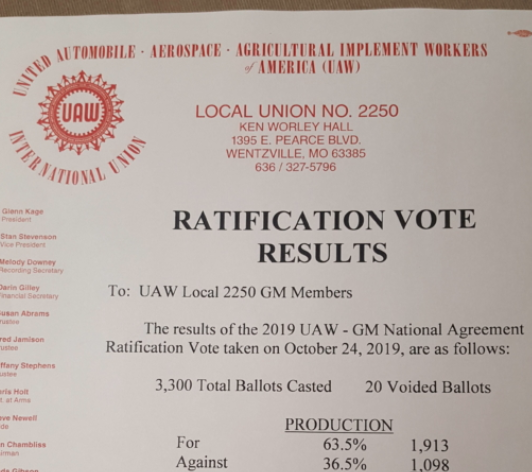ROMULUS, Mich. (AP) — Striking General Motors factory workers will put down their picket signs after approving a new contract that will end a 40-day strike that paralyzed the company’s U.S. production.

The United Auto Workers union said in a statement Friday that workers had approved the new four-year deal. But no vote totals were given. The union says it will announce shortly whether it will bargain next with Ford or Fiat Chrysler.
Good news in United Auto Workers and General Motors coming to terms on a new contract, which means getting people back to work at GM's Fairfax Assembly Plant. Thanks to all who worked diligently to end the strike.
— Governor Laura Kelly (@GovLauraKelly) October 25, 2019
Picket lines were to come down immediately, and skilled trades workers will begin restarting factories that were shuttered when 49,000 workers walked out on Sept. 16. Some production workers could return as early as Friday night.
The deal includes a mix of wage increases and lump-sum payments and an $11,000 signing bonus. But GM will close three U.S. factories that make slow-selling cars and transmissions. Analysts estimate the strike cost GM more than $2 billion.
The five-week walkout was big enough to help push down September U.S. durable goods orders by 1.1%, the largest drop in four months.
Trades workers such as machinists and electricians likely will enter the plants quickly, restarting boilers and preparing paint shops, robots and other equipment to restart production.
On the picket line at a transmission plant in Romulus, Michigan, worker Tricia Pruitt said the wage gains were worth staying off the job for more than five weeks, but she’s ready to return to work.
Pruitt, a 15-year GM employee, was happy that the contract brings workers hired after 2007 up to the same wage as older workers in four years.
She’ll be glad not to be on the picket line if the strike ends. “Look at us now. We’re in coats,” she said on a gray, chilly Friday afternoon near Detroit. “We’d have been out here in the rain.”
Although GM dealers had stocked up on vehicles before the strike and many still have decent supplies, analysts say GM won’t be able to make up for the lost production. Had the strike been shorter, GM could have increased assembly line speeds and worked the plants on overtime to catch up and refill its stock. But many of the plants that make popular SUVs and pickup trucks already were working around the clock to keep up with demand before the strike began.
Also, companies that supply parts to the factories and halted production during the strike will need time to restart, although GM has some parts in stock.
Jeff Schuster, senior vice president of the consulting firm LMC Automotive, estimates that GM has lost production of 300,000 vehicles, and he said maybe only a quarter of it can be made up.
“You can’t add days to the week and you can’t add hours to the day,” he said.
Some production losses will help thin inventory, especially of cars, Schuster said. But in late October and early November, GM will likely run short of colors and models of trucks and SUVs that are in high demand until stocks are replenished, he said. Although truck and SUV buyers generally are loyal to a brand, customers in a hurry for a new vehicle could go elsewhere, Schuster said.
“There are definitely going to be some limitations on choice, and that is a risk,” Schuster said. “Consumers can opt to wait, or they can go down the street to their competitor.”
Now the union will move on to bargain with either Ford or Fiat Chrysler, using the GM deal as a template. A decision on which company is next could come Friday. It’s not clear yet if there will be another strike, but neither Ford nor FCA will be happy about being stuck with the GM terms.
GM traded the ability to close the three factories in Lordstown, Ohio; Warren, Michigan; and near Baltimore for higher labor costs, David Kudla, chief investment strategist for Mainstay Capital Management of Grand Blanc, Michigan, wrote in a note to investors. The contract maintains worker health benefits with low premiums, something that both Ford and FCA wanted to change when negotiations began.
“Ford and FCA didn’t have three factories that they wanted to close, but will have to work around this new framework for higher wages and unchanged health care that the UAW and GM have set,” wrote Kudla, whose firm manages investments for many auto industry workers.
Workers at factories that GM will close have been transferred to plants across the nation, and they campaigned against the deal, which was reached Oct. 16. Workers in Lordstown, for instance, voted 412-61 against it, with 88% of production workers voting “no.”
In the end, economic gains and a $7.7 billion GM investment pledge for U.S. factories were too much to turn down.
